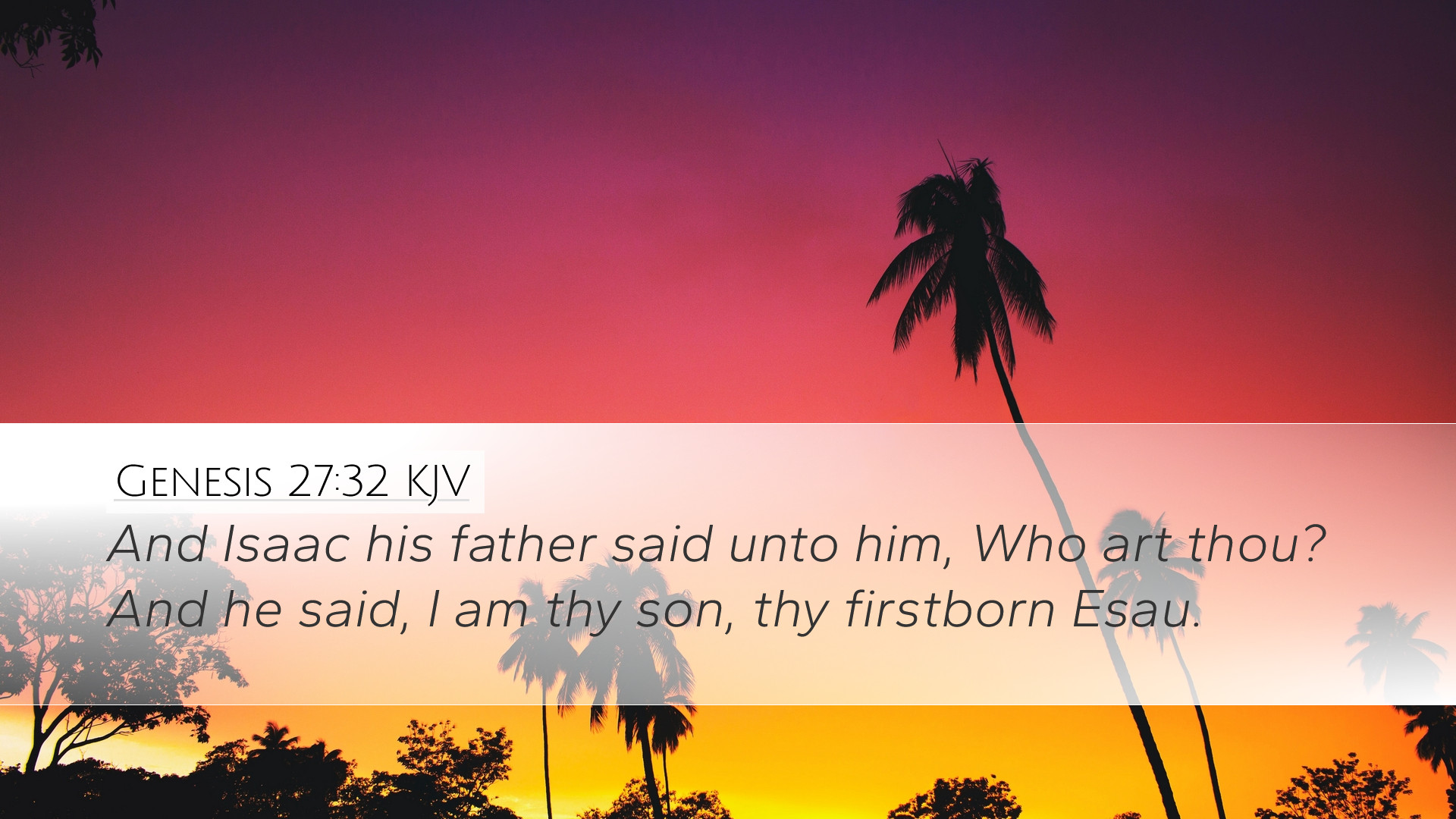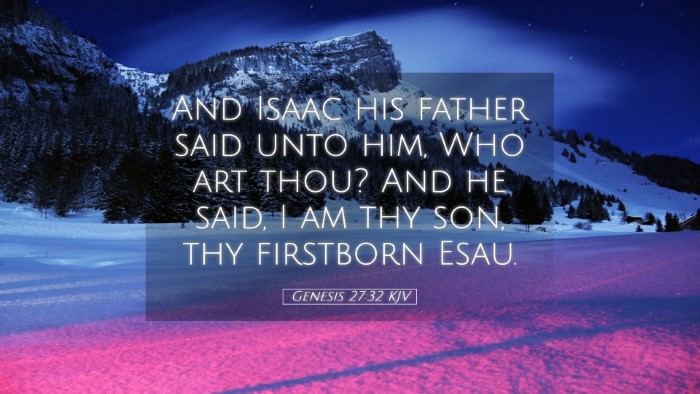Commentary on Genesis 27:32
Text of the Verse: "And Isaac his father said unto him, Who art thou? And he said, I am thy son, thy firstborn, Esau."
Introduction
This pivotal moment in Genesis provides deep insight into the themes of identity, deception, and familial dynamics. Isaac's question, "Who art thou?" coupled with Esau's identification, highlights the tension between the expected and the actual. This commentary synthesizes the thoughts of several notable theologians to render a multifaceted understanding of this significant event in biblical history.
Contextual Overview
Prior to this moment, the narrative unfolds the various dynamics of Isaac's household, featuring the contrasting characters of Esau and Jacob. The promise of the birthright and blessing of the firstborn carries profound implications for the covenantal lineage of Israel. Understanding the context is crucial for grasping the weight of this exchange.
Divine Election and Human Agency
Matthew Henry emphasizes the sovereignty of God in choosing Jacob over Esau, despite Esau's position as the firstborn. This reflects the biblical principle that divine election is not based on human merit or performance but rather on God’s purpose and plan.
The Role of Deception
Albert Barnes notes the deceit employed by Jacob and his mother, Rebekah, to secure the blessing intended for Esau. This deception raises moral questions regarding the means by which divine promises are obtained. However, Barnes also suggests that the outcomes, despite the questionable actions, align with God's overarching plans.
The Significance of Identity
Adam Clarke highlights the question "Who art thou?" as not just a query of identity but also a moment of existential significance. Esau’s response reveals his desperation and need for his father’s blessing, a vital component of his identity within the patriarchal lineage.
Verse Breakdown
- "And Isaac his father said unto him, Who art thou?"
- Isaac’s question indicates confusion and perhaps a sense of foreboding about the deception he has unwittingly facilitated.
- It recalls the early biblical theme of God asking questions not for information, but for the purpose of self-revelation and reflection.
- "And he said, I am thy son, thy firstborn, Esau."
- This bold claim from Esau underscores his sense of entitlement and the weight of familial expectation resting on him as the firstborn.
- Esau’s assertion also highlights the gravity of the situation; he is confronting the loss of not just a blessing but his status within the family.
Theological Implications
The theological ramifications of this verse stretch far beyond the immediate context. It interrogates notions of blessing, identity, and divine providence.
The Mystery of Divine Providence
Henry observes that while Jacob's actions seem to impede the covenant's flow, God's purpose remains unthwarted. This theme resonates throughout Scripture, as divine plans often unfold in complex, unexpected ways.
Family Dynamics and Their Consequences
Barnes draws attention to the fractious relationships within Isaac's family, signaling the broader narrative of conflict and reconciliation seen throughout Scripture. Disunity in familial bonds foreshadows the struggles of the nation of Israel as they navigate their identity and relationship with God.
Practical Applications for Today
For contemporary believers, this verse and its surrounding narrative invite reflection on several practical applications:
- Identity in Christ: Just as Esau confronts issues of identity, modern Christians are reminded to seek their identity in Christ rather than in their earthly status or achievements.
- The Cost of Deception: The narrative calls for honesty and integrity within family and church communities, showcasing the long-term consequences of deceit.
- Understanding Divine Sovereignty: Believers are encouraged to trust in God's purpose and timing, even when fraught with human error and complexity.
Conclusion
This exploration of Genesis 27:32 reveals the depth of human experience intertwined with divine sovereignty. As Isaac and Esau grapple with issues of blessing and identity, readers are prompted to reflect on their own positions within their faith and community. The interplay of choice, deception, and divine election offers a rich tapestry for understanding the workings of God’s grace amidst human frailty.


